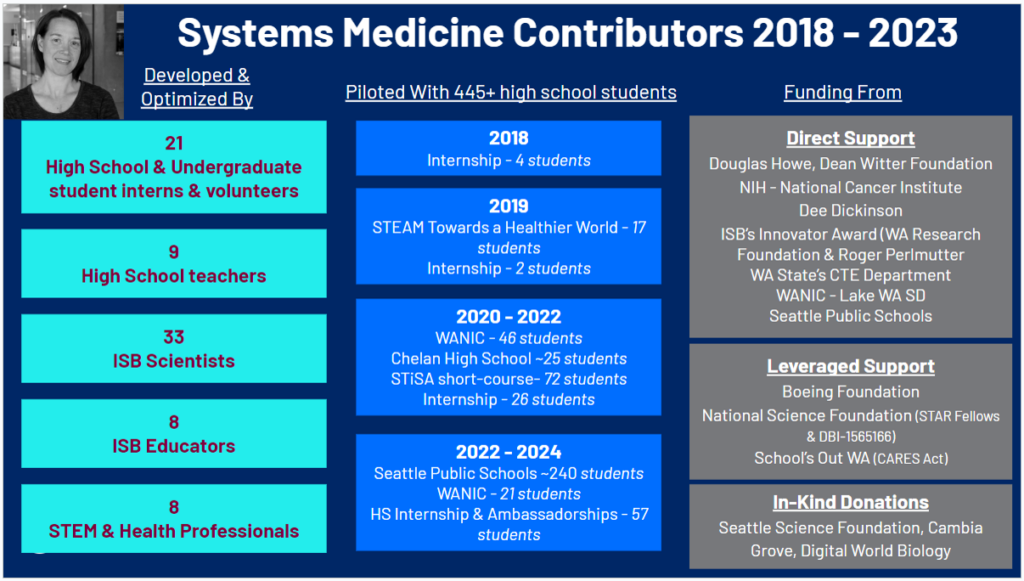- Introduction to Systems
- Systems Are Everywhere
- Bioengineering a Sustainable World
-
Computational Modeling
- Demystifying Machine Learning
- Ecological Networks
- Environmental Influence on Gene Networks
-
Invisible Forest
Unit Plan Lesson 0.5 – It’s Only a Drop of Water (Project Based Learning Plan) Lesson 1 – A Breath of Oxygen Lesson 2 – Who’s who in the photosynthetic world from macro to microscale Lesson 3 – Tools of the Trade Exploratorium: Collecting Oceanographic Data From Where We Cannot See Lesson 3.5 Phytoplankton, Spectrophotometry & Microscopy Labs Lesson 4 – Scaling up: Linking cells in a drop of seawater to global patterns Lesson 5 – Dive into Data: Raw to Results Contributors
-
Modeling Sustainable Food Systems
Food Security Module Overview Lesson FS1: Introduction to Food Security Lesson FS2: Critically Evaluating Food Production Techniques Application: Designing, constructing, and reengineering a system Lesson FS3: Who Cares? Stakeholders! Lesson FS4: Food Security as a System Lesson FS5: Why Don’t We Just Grow More? Lesson FS6: Where Does Our Food Come From? Lesson FS7: Summative Assessment – United Nations Council Meeting Contributors
-
Observing Beyond Our Senses
Unit Plan Lesson 1 – Introduction to Saline Environments & Microbial Halophiles Lesson 2 – Design Process-Measuring Wind Speed Lesson 3 – Inferences From Proxy Variable Mock AFM Lesson 4 – Signal and Noise Lesson 5 – Inferring Properties and Calibrations Lesson 6 – Death Valley Middle Basin Case Study Contributors
-
Ocean Acidification
Unit Plan Lesson 1 – Critical and Systems Evaluation of News Articles Lesson 2 – Exploring CO2 to Better Understand Ocean Acidification Lesson 3 – Defining the Problem: Ocean Acidification Lesson 4 – Planning Cohesive Experiments Lesson 5a – Ocean Acidification Experimentation Lesson 5b – Online Data and Supplemental Evidence Lesson 5b – Online Data and Supplemental Evidence (pre-2018 version) Lesson 5c – Using Ocean Acidification Models to Make Predictions Lesson 6 – Global Ocean Acidification Summit Contributors
-
Carbon’s Fate
-
Systems Medicine Education
-
Standards Addressed
- Community-Contributed
Systems Medicine Education
Interested in field testing lessons or modules? Please contact the SEE team at see@isbscience.org
A 4-module, full-year CTE course designed to align with the
Statewide Systems Medicine Framework (WA)

Students Will Learn About
| Individual and community health and wellness as a complex system that is impacted by many factors. | Innovative approaches for predicting disease risk and identifying actionable steps to prevent disease progression. | Interdisciplinary approaches for improving disease outcomes using insights from individuals’ personalized profiles such as their genetics, immune response profiles, etc. | Applying their knowledge and skills toward optimizing the health and wellness of their community. |
Topics Include
|
|
|
|
| Available for field testing now
Click here for a 1-page overview |
Available for field testing now
Click here for a 1-page overview |
In development | Available for field testing now |
This course and these modules are being field tested in Washington State at:
- Seattle Public Schools (at Ballard, Garfield, Franklin and Roosevelt High Schools),
- Chelan High School, and
- Washington Network for Innovative Careers (WANIC) which serves 8 school districts (Bellevue, Everett, Issaquah, Lake Washington, Mercer Island, Northshore, Riverview, and Snoqualmie Valley). See this WANIC video highlighting the Systems Medicine program.
| For more information on the course visit https://isbscience.org/systems-medicine-education/ and contact the team at see@isbscience.org. |
Thank you to our very active team for making this course happen! Stay tuned to this page for updates on the curriculum, the course roll-out, and the team behind the work.


